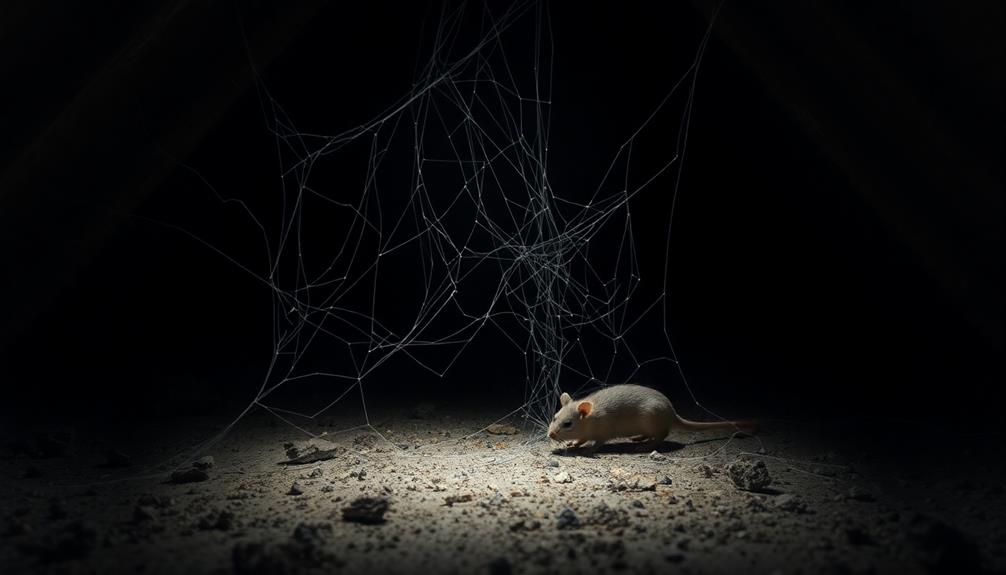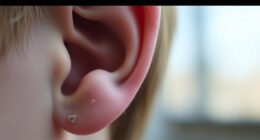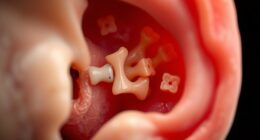A dead mouse gives off a very strong and yucky smell! It often smells like rotten cabbage mixed with a hint of ammonia or overripe hay. In small or closed spaces, this odor can feel really overwhelming. As time passes, the smell gets even worse because the mouse decays, and it can stick around for days or weeks. You might catch a whiff of this unpleasant scent if there's a mouse hiding in a wall or attic. Keep an eye out – knowing the signs can help you tackle the issue quickly, and there's more to discover about handling it!
Key Takeaways
- A dead mouse emits a strong, musty odor resembling decomposing cabbage or overripe hay, often with fishy undertones.
- The smell intensifies over time due to bacterial decomposition, becoming rancid and overwhelming.
- This odor is particularly strong in small, closed, and poorly ventilated spaces.
- Environmental factors, like warmth and humidity, can prolong the duration of the smell for days or weeks.
- The presence of this odor indicates a potential rodent problem and may pose health risks from toxic gases.
Introduction

When you encounter the smell of a dead mouse, you're immediately struck by a powerful and unpleasant odor that can linger long after the source has been removed.
This dead mouse smell is more than just gross; it can really tell you a lot about what's happening in your home. The odor of a dead rodent is often a mix of sweet and repugnant scents, sometimes reminding you of decomposing cabbage or over-ripe hay. It might even have a fishy undertone!
As time goes on, the smell of a dead mouse gets stronger, especially as the mouse decomposes. Environmental factors, like heat and ventilation, play a big role in how long that smell sticks around.
If it's warm and there's not much air moving, that odor can last for days or even weeks!
If you catch a whiff of this unpleasant scent, it's a good sign there might be a rodent problem.
Description of the Smell
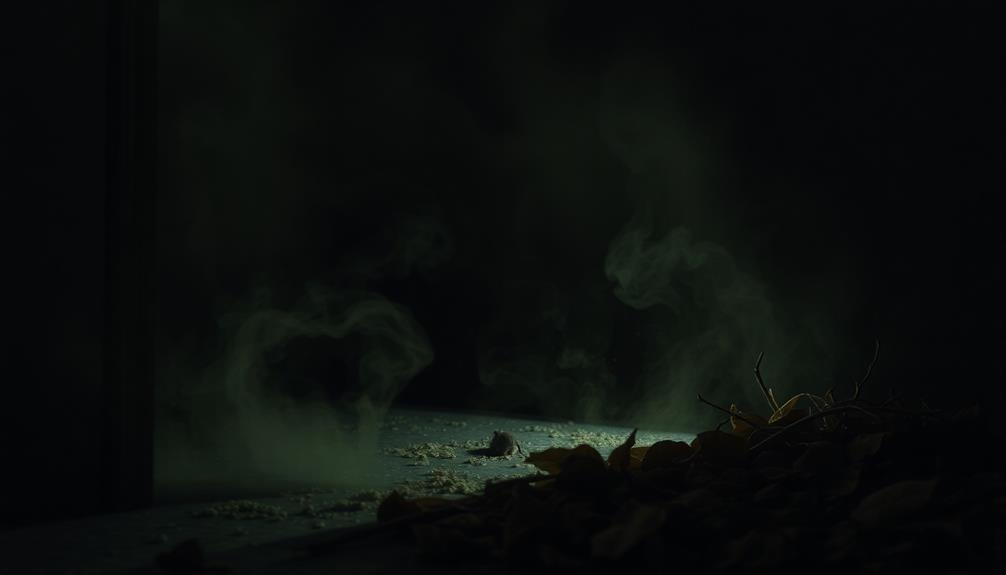
The smell of a dead mouse is unmistakable and can be deeply unsettling. Imagine walking into a room and catching a whiff of something that reminds you of rotten cabbage or overripe food. That's the pungent odor you'd face!
As the dead animal begins to decompose, the scent changes. It might start mild, but it becomes a strong, musty scent, like sour milk or wilted flowers.
If you're in a small, closed space, the smell can feel even more potent, filling the air and making it hard to breathe. The mouse's diet before it died can make the smell even worse! You might notice it lingering for days or even weeks.
But in warmer, drier areas, it could disappear in just a few days.
This odor comes from gases and compounds released during decomposition, including things like sulfur dioxides and ammonia. As time goes on, the smell can become overwhelming.
It's a scent you won't soon forget, and it makes you appreciate the fresh air outside!
Source and Composition
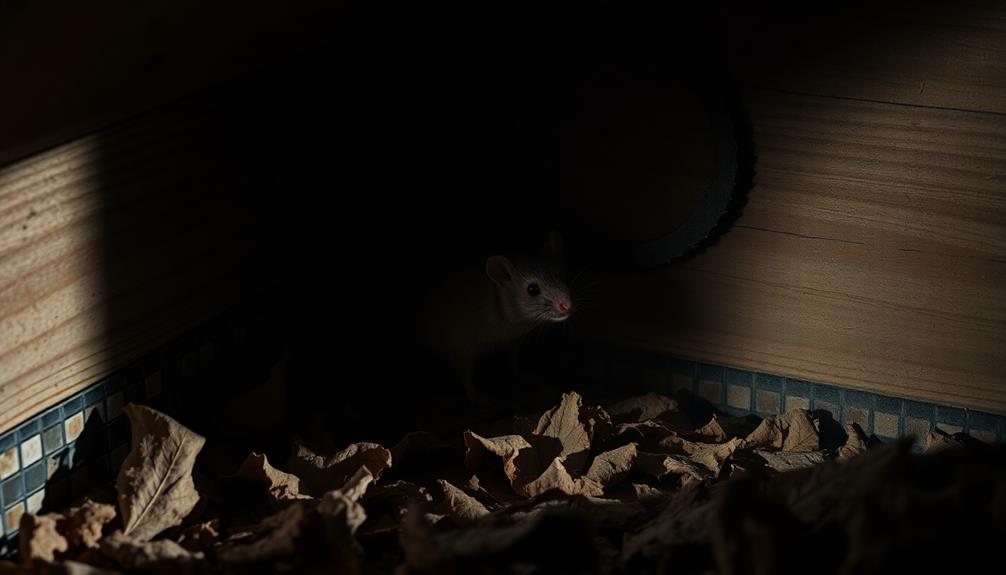
Understanding the source and composition of a dead mouse's smell reveals why it's so potent and memorable. When a mouse dies, its body starts to decompose. This process creates a strong odor caused by bacteria breaking down the carcass. At first, the smell might be mild, but as time passes, it turns into a powerful, rancid scent, kind of like rotten cabbage! As the decomposition progresses, compounds like putrescine and cadaverine are released, contributing to the unmistakable stench associated with decaying matter. These compounds are key contributors to the **dead body smell characteristics**, which can linger for days or even weeks, depending on environmental factors such as temperature and humidity. Homes or spaces affected by this odor can be difficult to clean thoroughly, as the smell often seeps into surrounding materials like walls or carpets.
The odor of a dead mouse mainly includes gases like sulfur dioxides and methane. These gases mix together, creating a unique smell that can fill up a room. Interestingly, the mouse's diet before it died can change the smell too! If it ate fish, you might notice a fishy note. If it enjoyed something sweeter, that could show up in the odor as well.
This smell is similar to other decomposing things but stands out because of its musty and pungent quality. You might find that the odor sticks around for days or even weeks, especially if the carcass is hidden in a wall or a tricky spot.
Typical Scenarios or Environments
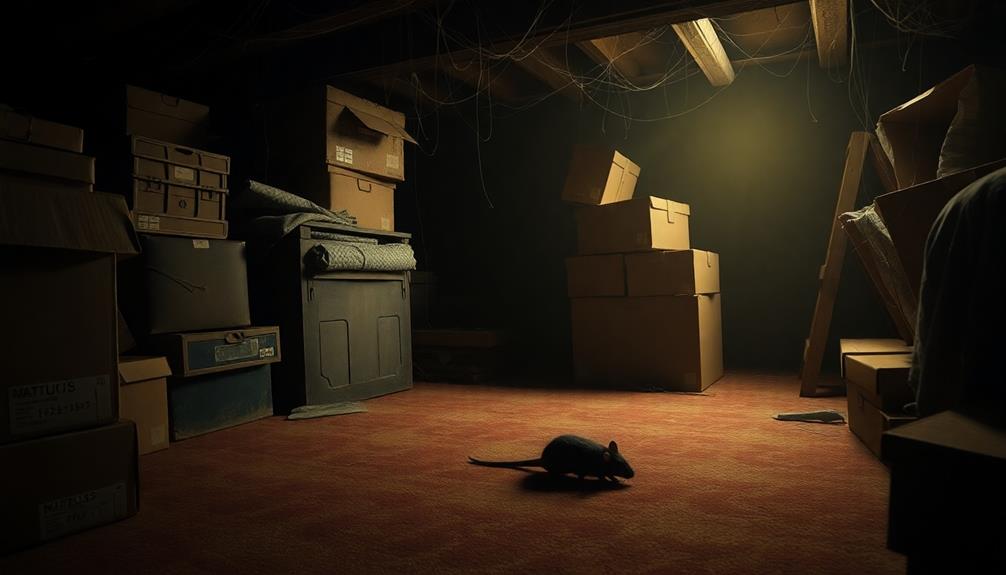
Dead mice can turn up in various typical scenarios and environments, each affecting the intensity and nature of their odor. You might find a dead mouse in a wall cavity, where the smell can be hard to pinpoint. At first, the odor might be mild, but as time goes on, it can get stronger, especially in warm and humid places. This is because decomposition happens faster when it's warm!
In a poorly ventilated area, like an attic or behind appliances, the smell can linger for days or even weeks. Imagine the scent being a mix of decomposing cabbage and musty odors, filling the air without any fresh air to clear it out.
If you notice increased insect activity, like flies or maggots, that could be another sign of a nearby dead mouse.
Different environments can change how the smell behaves. For example, in a dry and warm area, the odor mightn't be as intense as in a damp and cooler spot.
Emotional or Cultural Associations

Have you ever noticed how the smell of a dead mouse can evoke strong emotional reactions? That odor often reminds people of decay and filth, making them feel disgusted or anxious. You might even think about the disease and infestation that can come with it!
In books and movies, the smell of a dead mouse can symbolize neglect or poor choices, helping to highlight themes of mortality and decay.
Culturally, many folks have stories or superstitions about mice. A dead mouse and its smell might be seen as a bad omen or a sign of bad luck. When you catch a whiff of that unpleasant scent, it can trigger emotional responses like revulsion or fear. These feelings often relate to a broader fear of pests and what they mean for cleanliness and safety.
You might also remember childhood moments, like finding a dead animal, which can bring a mix of emotions. These memories can be different for everyone, depending on cultural backgrounds.
Health or Safety Considerations
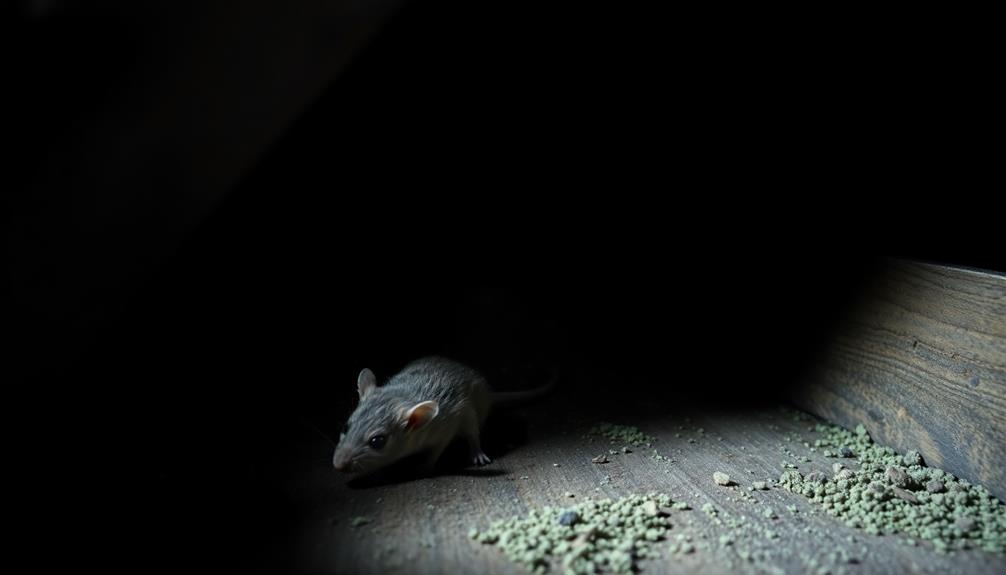
A strong odor from a decomposing mouse can pose serious health risks that you shouldn't ignore. When you smell a dead mouse, it's not just a stinky nuisance; it can release toxic gases like methane and ammonia. Breathing in these gases can lead to headaches, nausea, and even respiratory issues, especially if you're sensitive or have health conditions.
It's important to remember that dead mice smell can also harbor harmful pathogenic bacteria. This means that handling the mouse without care could spread diseases. To keep yourself safe, it's crucial to wear protective gear, such as gloves and masks, during the removal process.
If you're exposed to the smell for too long, you might find yourself dealing with allergic reactions or worsening respiratory problems.
That's why removing the source of the odor quickly is essential for your health.
Final Thoughts
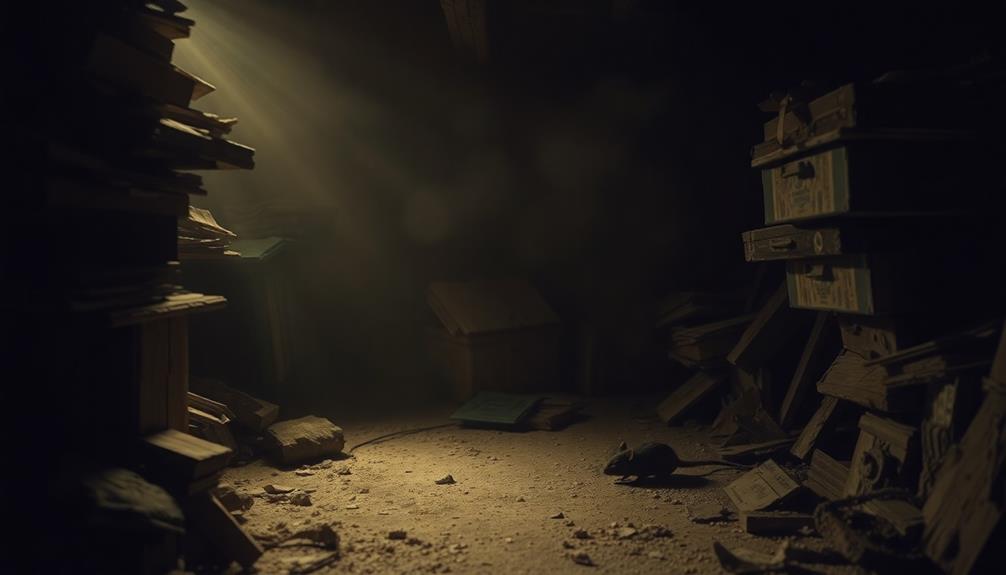
While encountering the smell of a dead mouse can be alarming, understanding its implications helps you take the right steps. The strong odor, often described as a mix of rancid cabbage and ammonia, can be quite unpleasant!
As decomposition continues, that smell might get even stronger, lingering for days or weeks, especially in closed spaces.
It's important to remember that this smell signals something that needs your attention. A dead mouse means there's a decomposing carcass nearby, and you should act quickly. Not only is the smell annoying, but it can also pose health risks like respiratory issues, nausea, and headaches.
Those nasty odors come from the volatile organic compounds released during decomposition, and you don't want them hanging around!
To make your home safe and pleasant again, you need to identify and remove the source of the smell. Proper removal and sanitation are key to restoring a happy living environment.
Frequently Asked Questions
How Do I Know if a Smell Is a Dead Mouse?
To identify if a smell's from a dead mouse, pay attention to a strong, penetrating odor that evolves over time. Look for other signs like droppings or fluid stains to confirm your suspicion.
How Long After a Mouse Dies Does It Stop Smelling?
After a mouse dies, you'll notice the smell intensifying initially, peaking within a few days. It can linger for up to two weeks, especially in warm, humid areas, unless you address it promptly.
Is Breathing in Dead Mouse Smell Harmful?
Breathing in the smell of a dead mouse isn't directly harmful, but it can cause nausea and headaches. If you have allergies or respiratory issues, it's best to avoid exposure and remove the source promptly.
Is It Okay to Leave a Dead Mouse in the Wall?
It's never okay to leave a dead mouse in the wall. You'll face unbearable odors and potential health risks. Removing it promptly prevents further complications, like attracting other pests and incurring expensive repairs later on.
